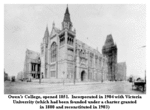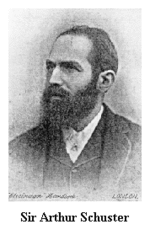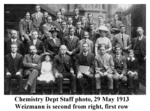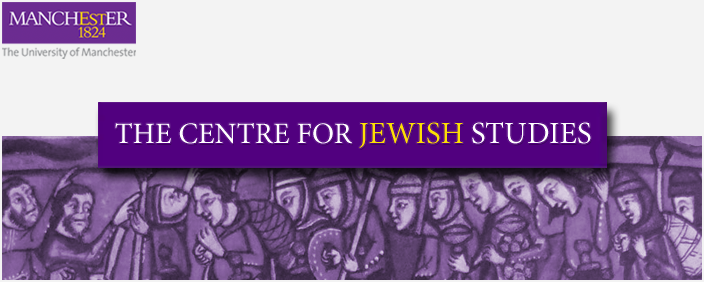11. Manchester University
 The charter of Owen’s College, which eventually became the University of Manchester, laid down as a "fundamental and immutable rule and condition" that its staff or students should "not be required to make any declaration as to, or subject to, any test whatsoever of their religious opinions." In the early years of the twentieth century, the University was also very much involved with the academic movement in Britain to encourage higher education for women.
The charter of Owen’s College, which eventually became the University of Manchester, laid down as a "fundamental and immutable rule and condition" that its staff or students should "not be required to make any declaration as to, or subject to, any test whatsoever of their religious opinions." In the early years of the twentieth century, the University was also very much involved with the academic movement in Britain to encourage higher education for women.
 Several Jewish academics who were able to enjoy this tolerant and progressive environment were also involved in some way with Zionism. The renowned philosopher Samuel Alexander, the only Jew ever to have received the Order of Merit and a personal friend of Weizmann, was converted by one of Weizmann’s speeches. The historian Lewis Namier also became a close confidant of Weizmann in the Zionist Organisation, and was involved in settling German-Jewish academic refugees during WWII. Dr Goldstone, a lecturer in Mathematics, was a chairman of Poale Zion in the early 1930s. The scientist Sir Arthur Schuster, while not actively involved, was a regular contributor to Zionist funds and left part of his library to the Hebrew University. And Dr NC Haring, a vice-president of the Manchester Jewish Hospital, occasionally lectured to the Zionist Association on subjects such as ‘The Education of the Young in Relation to Zionism’.
Several Jewish academics who were able to enjoy this tolerant and progressive environment were also involved in some way with Zionism. The renowned philosopher Samuel Alexander, the only Jew ever to have received the Order of Merit and a personal friend of Weizmann, was converted by one of Weizmann’s speeches. The historian Lewis Namier also became a close confidant of Weizmann in the Zionist Organisation, and was involved in settling German-Jewish academic refugees during WWII. Dr Goldstone, a lecturer in Mathematics, was a chairman of Poale Zion in the early 1930s. The scientist Sir Arthur Schuster, while not actively involved, was a regular contributor to Zionist funds and left part of his library to the Hebrew University. And Dr NC Haring, a vice-president of the Manchester Jewish Hospital, occasionally lectured to the Zionist Association on subjects such as ‘The Education of the Young in Relation to Zionism’.
 Chaim Weizmann, of course, was intimately connected to the University, from which he rented a laboratory during 1904 and by which he was employed as a chemistry demonstrator in 1905. He went on to become a Reader in Bio-Chemistry, but one of the greatest of his personal disappointments was that he was never elected to a professorial chair. It was while he was a lecturer at Manchester that he made his important discovery regarding the artificial production of acetone, a solvent need in the production of explosives and in short supply before the First World War. In 1979, the Chemistry Department of Manchester University and the Weizmann Institute, Israel, established a ‘Weizmann Memorial prize’.
Chaim Weizmann, of course, was intimately connected to the University, from which he rented a laboratory during 1904 and by which he was employed as a chemistry demonstrator in 1905. He went on to become a Reader in Bio-Chemistry, but one of the greatest of his personal disappointments was that he was never elected to a professorial chair. It was while he was a lecturer at Manchester that he made his important discovery regarding the artificial production of acetone, a solvent need in the production of explosives and in short supply before the First World War. In 1979, the Chemistry Department of Manchester University and the Weizmann Institute, Israel, established a ‘Weizmann Memorial prize’.
There were also students at University who came to be associated with Zionist activities in Manchester. Both Israel and Rebecca Seiff studied there, although Rebecca never completed her degree in the Women’s Department. Moshe Shevah, the first Yemenite to gain a degree at a western university, came to Manchester in 1928 on the advice of Dr Moshe Weizmann, the brother of Chaim. Like other Palestinian students in Britain, he worked his way through his chemistry studies by teaching Hebrew; in addition to his work at the Manchester Talmud Torah, he also popularised modern Hebrew at meetings he organised. Over the years, many Zionist meetings and events took place within the auspices of the University. Weizmann established the Manchester University Students’ Zionist Association around 1909 (he was elected president), and a University Zionist Society was running by 1912. These groups suffered from low attendance occasionally, as did the town organisations. At one small gathering of the Manchester Friends of the Hebrew University in the 1930s, flanked by Samuel Alexander and Lewis Namier, Weizmann is recorded as having consoled his audience by recalling that the Zionist movement had always consisted of "the select few… and just see what they have achieved."
Letter from Weizmann to CP Scott, outlining his career, undated
Weizmann's CV, undated
__________________________
IMAGE AND DOCUMENT CREDITS: Owen's College (Patricia Cummings), Schuster (Frank Adam), Chemistry Dept (Patricia Cummings), Letter from Scott (John Rylands Library, © The Guardian), Weizmann's CV (Mamlock House, Manchester) Full reference: Sources.



